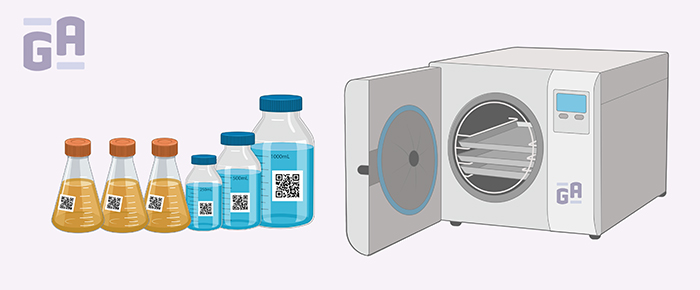
Select heat-resistant labels based on your application
It’s important to use labels that will maintain adherence, resist damage, and maintain printout quality when confronted with elevated temperatures. There are different situations during which your samples may be exposed to high-temperature conditions:
- Steam autoclaving for glassware and other labware, which requires temperatures as high as 150°C (302°F)
- Boiling water 100°C (212°F), typically used for sample preparation in SDS-PAGE
- PCR thermocyclers, which typically include a DNA denaturation step at 95°C (203°F) and heated lids, which can reach up to 110°C
For materials that require autoclaving or boiling water, sterilization labels like Steri-ThermoTAG™ and Steri-LazrTAG™ are available in either permanent or removable. Removable sterilization labels are especially useful, as they can be removed without leaving behind residue on your container, perfect for glassware that is regularly autoclaved and where reidentification is necessary. Autoclave indicator tape and labels that contain indicator strips showing your material has been sterilized appropriately are also useful tools.
For PCR, many options are available, though we recommend the patent-pending PCR-TagTrax®, which is compatible with all thermocyclers. These tags are made for PCR tubes, tube strips, as well as non-skirted plates, giving an adhesive-free option that provides ample room to print barcodes and text.
Consider chemical resistance and cryogenic storage
Many types of containers that require autoclaving often need to be re-disinfected before use, usually with spray bottles of 70% ethanol solution, bleach, or sanitizing wipes. Here, wrap-around will confer resistance to both autoclaving and short-term chemical exposure. These wrap-around labels can also be used on containers that must be autoclaved prior to cryogenic storage in ultra-low temperature freezers or liquid nitrogen.
Some applications, like antigen retrieval for immunohistochemistry, require exposure of the label to both high temperatures and harsh buffers. For these types of procedures, we recommend our patent-pending self-laminating thermal-transfer labels for microscope slides, which resist long-term immersion in xylene in addition to antigen retrieval conditions.
Choose an appropriate printing method
Thermal-transfer affords the greatest resistance to most harsh laboratory conditions, including heat, chemical exposure, and freezing. This method utilizes heat to transfer ink from a ribbon onto the label, which are provided in rolls, allowing you to print on demand. Thermal-transfer printing also provides the most options for different label materials, so you’re likely to find the product you need by sticking with thermal-transfer as your printing method. For instance, LabTAG makes high-heat resistant blackout labels for concealing sensitive or confidential information and piggyback labels that help track and organize samples and waste.
Laser and inkjet printers can also be used in high-temperature conditions and provide some resistance to smudging and fading. Because they use sheets of labels, these methods are for printing large batches of identical information and are more adept at including colors, especially inkjet printers.
Direct thermal is the only method of printing that should be entirely avoided for labels subjected to high temperatures. These labels are coated with a leuco dye that turns black when heat is applied. As such, when they are exposed to high temperatures, the entire coating of the label will react and turn black, making your printout completely illegible. Nevertheless, these labels can be used in cases where printed information needs to be intentionally obliterated after being exposed to heat.
It is important to consider your application as well as your labeling surface when choosing heat-resistant labels. Depending on your method of printing, autoclave and heat-resistant labels can be used for a variety of purposes. High temperatures can damage your labels as much as any other stress and sterilization can provide a series of obstacles that your labels need to overcome, including heat, high pressure, and humidity. Selecting the right labels is key to ensure they stay affixed and legible, preventing errors from creeping up in your lab and ruining your experiments.
LabTAG by GA International is a leading manufacturer of high-performance specialty labels and a supplier of identification solutions used in research and medical labs as well as healthcare institutions.